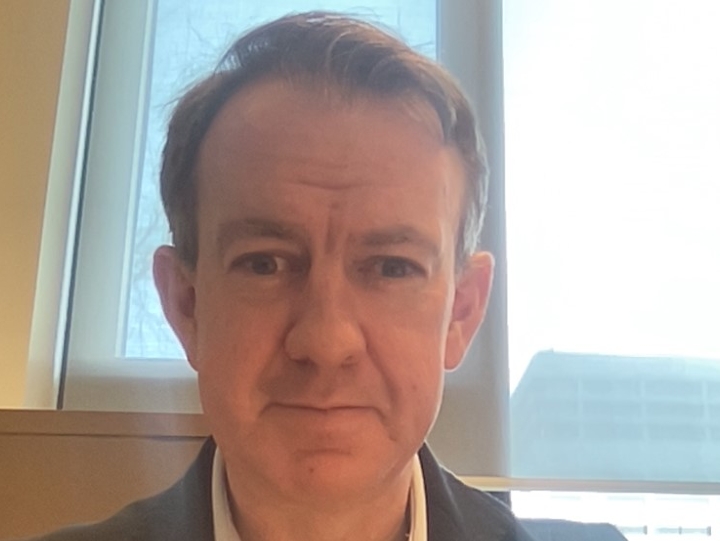
Why Is Good Character Formation Important to Our Democratic Future? Critical Conversations #32
Student Success Civic Engagement Civic Learning and Democratic Engagement Faculty VP for Student Affairs
March 3, 2023
JCC Connexions, Vol. 9, No. 1, February 2023
In "Character Development in Higher Education Using Classical Archetypes" and "A Theoretical Foundation for Classical Character Archetypes" (Journal of College & Character, vol. 24, no. 1, February 2023), Colm Fitzgerald, University College Dublin, presents four classical archetypes for use as one kind of character development methodology.
Colm responds to questions posed by Co-Editor Jon Dalton relating to his research:
1. You argue that the future of modern democracies depends upon the importance they give to character development. Why do you believe good character formation is so essential to the proper functioning of democratic societies?
I wish it was easy to explain why character is essential in a democratic country. One of the reasons I wrote my two JCC articles was to participate in persuading others about the merits of character formation and to demonstrate that character development is the primary route to improve organizations, corporations, and democratic countries.
Someone Who Makes a Difference in Our LIfe
In a simple sense, most people are fortunate to have had at least somebody in their life who acted in a way, beyond self-interest, that greatly benefited their life.
Someone Who Makes a Difference in Work
Similarly in our places of employment, when somebody goes beyond the call of duty to help us, it can greatly improve the quality of our work-life, in terms of what we can do, what we can achieve, and in the quality of our resulting life experience.
Someone Who Makes a Difference for All of Us
It is no different when considering all of us together. When we have even a small group of people who are willing to act beyond their own self-interest, it can significant impact both individual well-being and our general well-being. These actions are ultimately the fruits of character, and the aim of character development is to increase the quality and quantity of these actions.
A Shared Perspective
This is not just my own perspective. Many others hold the same perspective. For example, Alexis de Tocqueville, who wrote Democracy in America, highlighted the paradox that for a democracy to properly function and for it not to descend into a despotism, it is necessary that an "aristocracy" exists within the democracy (Tocqueville, 2008). This "aristocracy" contains individuals who may not even know each other, but who act according to higher standards than democratic society might expect of them (effectively behaving with the character of a citizen). Of course, if these powerfully minded individuals use their calibre otherwise, primarily only for their own narrower self-interest, acting as egoists, they can turn the democracy into an "oligarchy," and they can rule for their own benefit, albeit the quality of the life they achieve is meaner, and it would ignore and neglect the greater potential in their human condition to achieve even greater happiness, both for themselves and for others.
2. You discuss four archetypes of ethical behavior. How can these archetypes be useful in understanding human ethical behavior?
The approach taken to conceptualize the archetypes is psyche-centric rather than brain-centric.
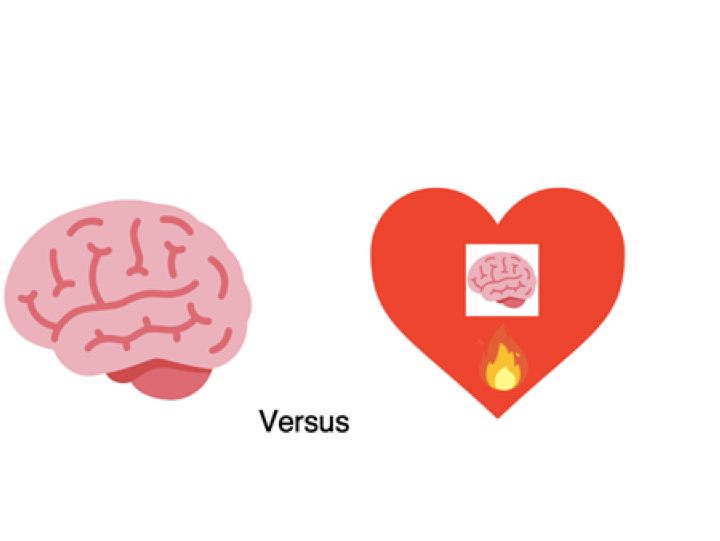
A simplified classical tripartite model of the psyche is used as being analogous to the heart, the head, and the guts, whereby the heart creates the stories and pictures of the world that individuals use, the guts give their minds the light and the energy they need, and their heads are limited to operating rationalizations within the boundaries created by their hearts and their guts.
Depending on how much an individual engages their heart, gut, and/or head determines their character.
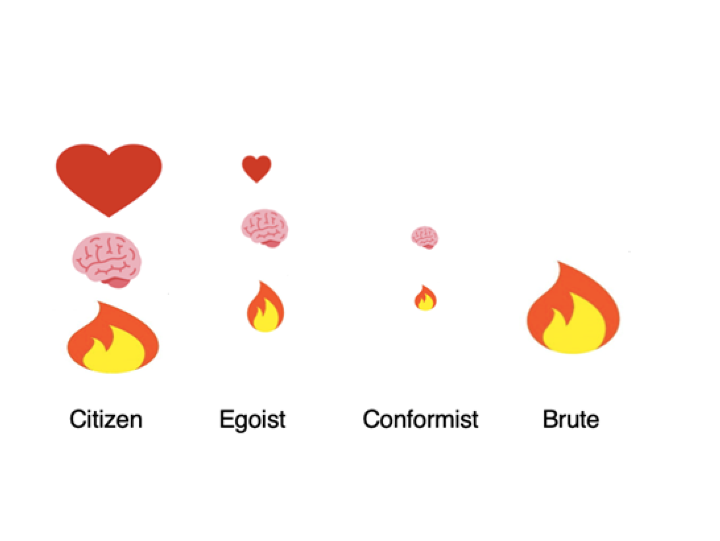
Character development effectively involves educating the heart, the guts, and the head. What cultivates the fruits of the heart, guts, and head are described pictorially below:
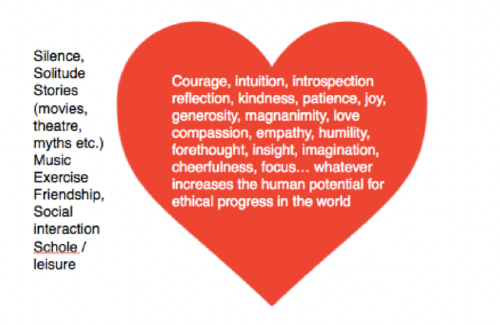
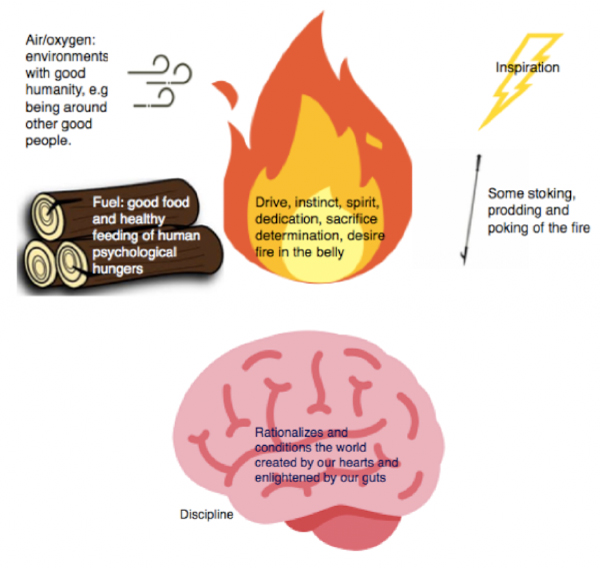
Why Do People Behave Differently?
We all have the same potential latent with our human condition. But different people actualize their hearts and guts in different ways, and consequently their heads are constrained to be able only to think within these boundaries. When somebody thinks or behaves differently than us, it is usually because their hearts and guts are different.
A Framework to Understand and Improve Ethical Behavior
In my opinion, this approach is not just useful to understand different ethical behaviors, but it is also a framework to help people, especially young people, to improve their ethical behaviors in a way that enhances both their own self-interest and the wider interests of society.
3. What critical roles do self-awareness and introspection play in the formation of character?
I must be honest, I am an actuary, so when I hear of self-awareness and introspection, sometimes it can sound airy-fairy. However, I can say that I have learned that self-awareness and introspection are significantly more powerful than mathematics. I’ve even created a test to measure how much a person is engaging introspection and their self-awareness, www.knowyourselftest.com.
A Misunderstood Concept
Knowing yourself is a very misunderstood term. It primarily means knowing the greater potential that exists within each human being, rather than the present actualization of this potential. Awareness of our full self is outside the immediate consciousness of our ego (our ego being the actualization of our self).
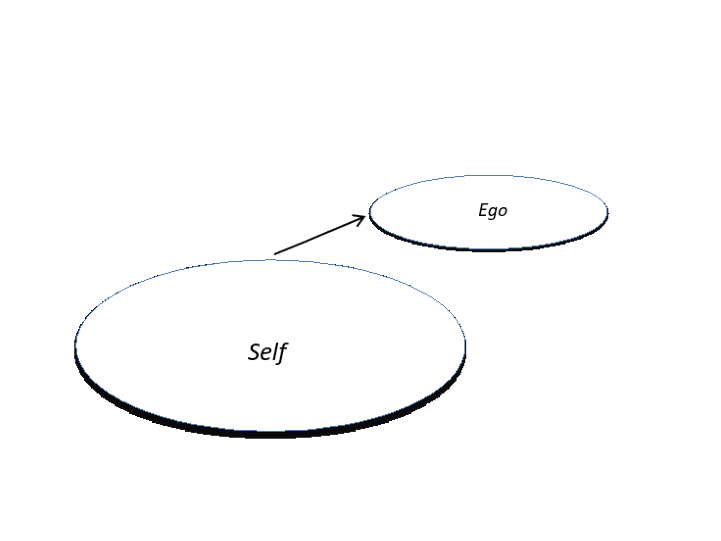
Our Secret Self
One approach that is useful to engage self-awareness rather than ego-awareness is the concept of our secret self by Stephen R. Covey (2015). He points out that “We live three lives: public, private and secret. The secret life is where your heart is, where your real motives are” (p. 3). It is engaging our secret self that enables us to engage introspection and fuller self-awareness.
The Powerful Secret
One significant difference between modern deities and those in ancient Greece is that the Olympian Gods were all vulnerable, even Zeus, despite being the most powerful god. He was vulnerable to the secret of Prometheus. Analogously, our secret self, from where we are capable of introspection, self-awareness, and forethought, is the most powerful aspect in our psyche.
We Are All at Heart the Same
Our hearts, our secret selves, while also being the most powerful part of our psyche, also enable us, somewhat paradoxically, to truly see, that despite outward differences, we are all at heart potentially the same, and that in this way, we are all related and have common interest.
4. What are some differences between an egoist and a brute? Aren’t they both primarily concerned with action out of self-interest?
Simply put, while both are relatively mean-spirited, egoists are competent, prudent, and individually responsible, and brutes are not.
Able to Cooperate
Being responsible means egoists know how to cooperate with others for their own benefit. They will reliably act according to the ethics set out by Axelrod (1990) in his book The Evolution of Cooperation. Egoists will likely reciprocate cooperation and defection and engage in a sound quid-pro-quo arrangement. They can be trusted to act prudently in a way that will be in their longer-term interests, unlike brutes who act for instant gratification and who will defect even when it might be better for them to cooperate.
Looking After Yourself Is a Necessary and Positive Thing
Despite the initial selfish impression that the egoist character might project, they are positive characters and according to John Stuart Mill (1985), becoming an egoist is a necessary step to becoming a citizen. On airplanes we are told, when needed, to put on our own oxygen mask before helping others because if we can’t help ourselves, trying to help others would be childish rather than realistic.
Egocentricity Is not a Prudent Way to Look After Yourself
In contrast, brutes are egocentric, and their behavior only worsens their ethical future.
5. Why do you think character development efforts have encountered so many difficulties in implementation in democracies?
I’m happy to point out that despite difficulties, character development has flourished to different degrees in different places, mostly thanks to the citizenship of those involved. The existence of the Journal of College and Character is testament to this.
A Novel Approach
There are natural difficulties with character development. My novel approach to character development aims at realistically overcoming these difficulties.
You Cannot Ennoble Somebody From the Outside You Know
First, in my opinion, character development is not the result of mere training. The concept of character goes over most people's and most students’ heads. Character development is an internal thing inside a person. Whether or not somebody can repeat or not what their professor teaches them in an exam on morals or ethics is not necessarily a reflection of their own level of character development. To suggest that it is risks adding to existing scepticism and cynicism that can exist. In my opinion, many people can at times be rightly sceptical of character development, just as it can be right to be sceptical of many other elements in our society. However, seeing students demonstrate character development, by demonstrating introspection, is more believable. It is much more likely to indicate genuine character development.
Character Development Needs to Be a Choice
Another issue is that not everyone wants to develop their character; it needs to be a choice. Some people just want greater security and comfort. Character development is difficult and is not a comfortable experience. But it is important that those who choose to want to develop their character are aided in their choice for the benefit of society. Those with a conformist character are also probably aware of what Alan Watts referred to as the taboo against knowing who we are, so they can be naturally averse to it (Watts, 1966). Many people in society engage each other on the basis of "you respect my persona and I’ll respect yours." Self-awareness, “Knowing Yourself” and thereby also knowing others, makes engaging with others not only more challenging, but outside the norm, a norm that many are not willing to transgress.
An Honesty and Realism About What Is Involved
If a student or indeed anybody decides that they would like to pursue character development, despite the psychologically difficulty, they are more likely to pursue it if it seems realistic to them. It is necessary to be honest about what is involved. Stephen Covey (2015) wrote that
Courage is required to explore your secret life because you must first withdraw from the social mirror of the reflection of ourselves that society feeds back to us but may have little to do with our inner selves. We get used to the view of ourselves in the social mirror. And we may opt to avoid self-examination and idle away our time in a vacuum of reverie and rationalization [for example on social media]. In that frame of mind, we have little sense of identity, safety or security. (p. 4-5)
Character development involves stepping back from the world. Our egos fight against this because it involves a sacrifice of the here-and-now and the sensation and stimulation it provides. But introspection enables us to climb to having a greater outlook on the world, where more is possible, where a better life can be seen as possible.
6. What are some of the best ways that colleges and universities can actively promote citizenship in its students?
In my opinion, promoting citizenship is difficult, but the difficulties can be overcome.
Was I Stupid?
I remember taking a European Monetary Integration module when I attended university in the 1990s. Our professor, now maybe regarded as one of top-10 economic historians in the world, was fairly definitive that a Euro currency would not work, and the module was all about why (mostly because Germany and Italy were too different, and because history suggested it wouldn’t work). I got a first-class honor in that module which I feel in a way makes me stupid. The Euro as you know came into existence shortly afterward.
Spirit not Intellect Rules the World
What I’ve subsequently learned is that in life it is human spirit that rules, not the human intellect. A European spirit created the new currency despite any reasons against it. Citizen-type leadership got the people of Europe to believe in it, and people have seen the advantages, notably not having to change money into different currencies in the EU. It has helped the feeling that people are part of the EU, not just their own country, increasing an in-it-togetherness in the EU, especially among younger people.
Whatever It Takes
This has not been an easy road without subsequent challenges. During the EU debt crisis in the early 2010s, when many thought the Euro would collapse, Mario Draghi, European Central Bank president at the time, famously and credibly said in 2012, he would do “whatever it takes” to protect the Euro (ECB, 2012). He did just that and the Euro still exists and still delivers benefits to those in the EU. In the same way, in my opinion, to promote citizenship, universities need to do the same, whatever it takes, that is, in a civilized rather than a brutal way!
When Reason Can Be Against You
There can be reasons against doing this. One such reason might come to mind; for example, I’ve heard it mentioned (cynically perhaps) that universities are about students applying their fire to light up what the professor tells them and confirming his or her thinking in the exam. This might be however right/wrong, realistic/unrealistic that is. This can be brutal, like the earlier example, and as outlined in the book Excellent Sheep by ex-Yale professor, William Deresiewicz (2015). The realpolitik is universities reward drive and conformity, not citizenship. Mostly that drive is individualistic to get better grades because these are "currency" students can use to land the job they want.
A Novel Approach to Fraternities
One way I have promoted citizenship, other than delivering the character development module mentioned in my JCC articles, is by setting up fraternities. These fraternities are perhaps different from traditional U.S. university fraternities, in practice rather than in their original spirit. The fraternities reward students for citizen-type behavior, but where their inner-brute, inner-conformist, their inner-egoist and inner-citizen all gain, so there is a realism to it all, plus some monetary funding. The fraternities are small groups. In my opinion, trying to improve citizenship needs to start small to be realistic. The fraternities act as potential future business networks, so a student’s inner egoist gains from involvement (it might help them get a job or a better job). The extra help the student gets aids security providing a conformist benefit, and it is free, so their inner brute sees a benefit. There is a hierarchy in the fraternities, and students can only be promoted by acts of citizenship, where they carry out actions that help other students, specifically those younger than they, and specifically helping them with character development. There is opportunity for leadership by becoming the president of the fraternities. These fraternities exist with an element of secrecy to separate them from the bigger and sometimes less healthy cultures at university.
Leadership From Former Students
These were not easy to set up, and I couldn’t have done so without the inspirational citizenship of the initial founding fraternity presidents who, unlike other students, won’t have benefited from citizenship from the fraternity as associated members will have. Should associated members, who get free help, decide to offer help to others, they can become inducted members and can potentially become president.
Intrinsic Actions Create the Reward of Optimism
I’m deeply grateful to the initial founding presidents who were mostly final year students or recent graduates. In order to keep these fraternities alive, though, I believe that “whatever it takes” attitude will be needed, albeit should they grow, they will hopefully create an impetus for further such actions to promote citizenship. In my experience, intrinsic actions normally only get intrinsic rewards, but this usually includes optimism, which strengthens the heart for further intrinsic actions. For me this is the best way to promote citizenship in university students.
References
Axelrod, R. (1990). The evolution of cooperation. Penguin.
Covey, S. R. (2015). Primary greatness. Simon & Schuster.
Deresiewicz, W. (2015). Excellent sheep, the miseducation of the American elite. Free Press.
ECB (2012). Verbatim of the remarks made by Mario Draghi. https://www.ecb.europa.eu/press/key/date/2012/html/sp120726.en.html
Mill, J. S. (1985). On liberty. Penguin.
Tocqueville, A. (2008). The ancien régime and the revolution. (G. Bevan, trans). Penguin.
Watts, A. (1966). The book on the taboo against knowing who you are. Pantheon Books.